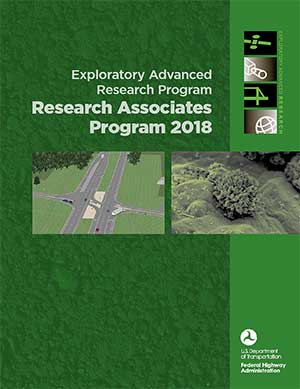U.S. Department of Transportation
Federal Highway Administration
1200 New Jersey Avenue, SE
Washington, DC 20590
202-366-4000
Federal Highway Administration Research and Technology
Coordinating, Developing, and Delivering Highway Transportation Innovations
| BROCHURE |
| This brochure is an archived publication and may contain dated technical, contact, and link information |
| Publication Number: FHWA-HRT-18-061 Date: January 2019 |
Publication Number: FHWA-HRT-18-061 Date: January 2019 |
PDF Version (8.17 MB)
PDF files can be viewed with the Acrobat® Reader®
Since 1954, the National Research Council (NRC) has conducted the Research Associateship Program (RAP) in cooperation with sponsoring Federal laboratories and other approved participating research organizations. RAP provides highly skilled and exceedingly promising postdoctoral and senior scientists and engineers with opportunities to research problems that are compatible with the interests of sponsoring laboratories. RAP offers recent doctoral graduates opportunities for concentrated research with selected members of permanent, professional, laboratory staff and allows them to contribute to the overall efforts of the laboratories.
The Federal Highway Administration (FHWA) has participated in RAP since 1992. To supplement the expertise of permanent staff, FHWA’s Turner–Fairbank Highway Research Center (TFHRC), through its Exploratory Advanced Research (EAR) Program, invites researchers with appropriate backgrounds to investigate specific problems on a short-term basis across a wide range of topics and disciplines.
NRC provides a process for selecting candidates on a competitive merit basis and, subsequently, for administration of the resident fellows during their tenures at FHWA. The process begins with a prospective FHWA adviser developing a proposed research opportunity. The adviser then coordinates with FHWA leadership to approve the opportunity and forward the proposed research to NRC. All research opportunities require an abstract that relates to exploratory advanced research and is of specific relevance to the FHWA research program. One of the significant benefits of this process is that it encourages interaction between government researchers and new researchers who are using cutting-edge approaches and research tools in their work.
RAP provides opportunities for FHWA’s EAR Program to advance research methods used at TFHRC. Over the years, associates have researched topics as diverse as cost-benefit analysis of connected and automated vehicle operations, nano-additives for concrete and asphalt, alternative intersection and interchange design, and modeling to predict collisions based on driver behavior and environmental conditions.
The following pages contain summary descriptions of some of the research projects that the resident fellows have been involved in during their respective tenures at FHWA.
